The European Parliament building in Strasbourg © European Union
It’s an interesting fact to note that the 9th May saw celebrations in Russia and in the European Union, but they weren’t celebrating the same thing and they weren’t much alike. Vladimir Putin had hoped to complete his invasion of Ukraine so that he could emerge the heroic victor in front of his rapturous and admiring people, although there’s nothing very heroic about murdering citizens, bombing their homes and raping women. Still, that was his aim, and his celebrations in Moscow involved tanks, guns, military fly-pasts and rank upon rank of soldiers in uniform, marching smartly with heads held high and carrying their weapons. The celebration in Strasbourg was very different and devoted to peace and to a hoped-for brighter future. It marked the conclusion (for now) of a long process of public consultation on how to take the European Union forward, which has produced more than 300 proposals to achieve 49 objectives. It was an ambitious project, involving consultations with a wide range of people of different nationalities and of different ages and backgrounds: around 800 of them in all. Dubravka Šuica, a Vice-President of the European Commission from Croatia’s centre-right Croatian Democratic Union (HDZ) reminded delegates in a speech to a packed European Parliament chamber in Strasbourg that the Schuman Declaration, which led to the foundation of the European Coal and Steel Community, was as valid today as when it was spoken on 9 May 1950.

Schuman believed that by uniting the industries that he considered to be “the engines of war”, namely coal and steel, he would render future conflicts out of the question. It would, as he put it, make war between those historic rivals, France and Germany, “not merely unthinkable, but materially impossible”.
Of course, the European Coal and Steel Community would develop into the European Community eventually, it matured into the EU. Celebrating that event seems a much more sensible thing to do than to celebrate Russia’s unachieved “victory” over Ukraine, which it attacked on 24 February as the first step in a war that Putin is still fighting. As Dubravka Šuica put it, “our democracy is louder than Putin’s bombs”. We will find out just what the European public suggested quite soon: Commission President Ursula von der Leyen has promised to introduce at least one of the ideas put forward in the Conference on the Future of Europe as a proposal for legislation during her State of the Union address to Parliament this September. One leading contender for legislation is to replace the requirement for unanimity with one for qualified majority voting. Hungary and Poland won’t like it, but most other countries will welcome it as a way to achieve things more quickly and to cut through the tangled jungle of bureaucracy.

Hungary and Poland are both EU member states, however, even if their politicians believe that EU laws don’t apply there. Some EU politicians and officials favour a strong line against the two countries, whose populations seem to favour remaining in the EU. Others prefer the “softly, softly” approach. “That was always Ms. Merkel’s course and that is also Ursula von der Leyen’s approach,” said German Socialist MEP Katarina Barley in an interview with Der Spiegel: “dialogue, building bridges, no confrontation. The Polish government has now been in office for six years and the Hungarian government for eleven years. We can now see where the course of the dialogue has led. In Hungary one can hardly talk about democracy anymore. In Poland, the rule of law is being eroded. We should not repeat the mistakes of the past few years. More consistent measures are now needed.” EU pay-outs to Poland and Hungary are now being withheld after much prompting and even then somewhat reluctantly. “It’s far too late,” Barley said. “I also have little confidence that she will hold out in her position.
With the best will in the world, I cannot imagine which argument should be used to pay out the money now; but I think anything is possible with this Commission.” A recalcitrant Poland and a barely democratic Hungary are just two more problems to dump on von der Leyen’s desk. The EU does have one card up its sleeve, though, as Barley told Der Spiegel: “80 percent of Polish citizens want to stay in the EU.”
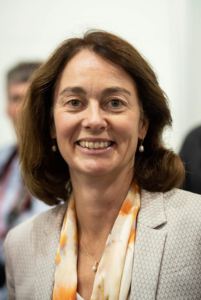
It’s hard to know which way to go when the directions are unclear and seem to be self-contradictory. The EU has faced hazardous times before and it will again, but the right decisions now could help set out a sensible route through them. Probably. Because while our politicians (or most of them) are trying to sort truth from fiction, other forces, backed with large sums of money and a lot of technology, seem to be spreading deliberate disinformation. Some politicians, especially but not exclusively in Russia and the United States, are apparently helping in this endeavour. It looks as if they’re trying to boost their own profits by somewhat dishonest (and certainly dishonourable) means. Russia especially has become a global exporter of lies, trying to substitute its chosen fiction for reality. Russia is not alone in spreading untruths, of course, but it seems to have become a world leader in the field. Perhaps that’s why it kills journalists in Ukraine, just in case they tell the truth and the rest of the world gets to find out what Ivan and Gregor have really been up to in the name of the fatherland. Russia also used artificial intelligence (AI) to plant false information in the West about the Covid pandemic, such as the scientific nonsense that the illness was caused not by a virus but by the new 5G mobile phone networks. Many who should have known better (and clearly weren’t paying attention during physics lessons at school) latched onto this ridiculous idea and even attacked phone masts physically. Putin must have laughed himself silly at that: ordinary people doing his work for him, at risk to themselves and to their own disadvantage. We must assume, I suppose, that he was hoping to cause people to ignore the sensible measures introduced by governments to slow the spread of the virus (such as mask wearing, inoculation and social distancing) and thus to raise the death rate. In other words, Putin was trying to kill you. He is using disinformation as a weapon in an undeclared war. Did you even know you were a combatant?
GIMME! GIMME! GIMME!
Putin’s avaricious attitude towards neighbouring countries, especially those that were once part of the Soviet Union, is making people in the European Union think hard about how best to resist him.
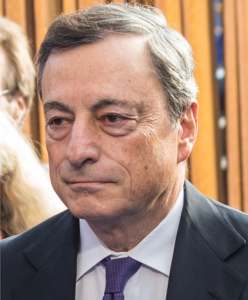
It all feeds into this ongoing debate about Europe’s direction. “With the pandemic and the war,” Italian Prime Minister Mario Draghi told MEPs, “The EU institutions have taken on unprecedented levels of responsibility.” He believes the answer lies in what he called: “pragmatic federalism”. Basically, it means more shared decision-making. “We must show the citizens of Europe that we are capable of leading a Europe that lives up to its values, its history, and its rôle in the world.” Draghi is most remembered for his response to the euro-crisis during the currency’s early existence. At the time, the new currency was coming under pressure because of bail-outs by debt-laden members who were pushing it to the brink of collapse. Some commentators, predicting the new euro’s impending demise asked Draghi: “what would you do to save it”. His reply is legendary: “Whatever it takes,” he said. It worked. At a plenary session of the European Parliament in early May to discuss Europe’s future and how it is coping with the double challenge, several MEPs reminded him of his famous remark. Their point seemed to be that a similarly bold approach is needed now. Draghi told MEPs that they must help to defend “our EU values”, which he listed as “peace, humanity and solidarity,” all of which are under threat from both Putin and the global and still-mutating virus (they’re not related, although they sometimes appear to be working together).
Talking of Putin and his war, in which Ukrainians allege that Russian soldiers have been engaged in looting, as well as murder, rape and the shelling of private housing, Draghi wants to commit to helping the beleaguered country. “By protecting Ukraine, we are also protecting ourselves,” he told MEPs.
Some 5.3-million Ukrainians have left their home country to come to the EU, mainly women and children. But we mustn’t forget that Ukraine itself is (or was before Putin’s invasion) the EU’s 4th largest supplier of foodstuffs. Things are not so rosy now, with the Eurozone experiencing 7.5% inflation, while the EU’s predicted growth for this year is down to 2.9% from 4% at the start of the year.
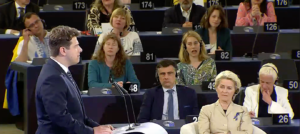
Strangely, Europe spends three times as much on defence as Russia does, but on a more divided and less coherent basis. One of the speakers at the concluding session of the Conference on the Future of Europe was Kacper Parol, a Polish delegate, who reminded his audience that: “Our future is here in the European Union,” going on to say that: “We must stand together, build a European identity together. We need more Europe.” Note that expression: “more Europe”. He was also critical of the older generation, or at least of those who pay no attention to warnings about the environment. “Our leaders don’t listen” he said, “although by ignoring climate change they are stealing our future.” Again, taking decisions on the basis of qualified majority voting would make such progress easier, as well as making it harder (and certainly much more expensive) for those who would prefer to retain the status quo to buy the votes they need to get an outcome more favourable to a particular corporation or set of beliefs. It would allow a more collegiate opinion to succeed against vested interests and recalcitrant member states.
Not everyone is likely to want to see the EU taking over more responsibilities from member states. For instance, the EU is proposing to introduce legislation against what are called SLAPPS – Strategic Litigation Against Public Participation: law suits brought not because of wrong-doing but simply to silence opponents.

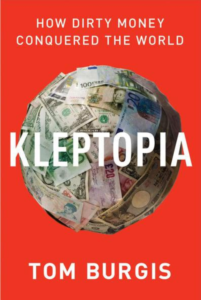
The move against SLAPPs is to prevent the wealthy and powerful – including governments of whatever flavour – from trying to silence their critics with endless and costly legal actions. Catherine Belton, author of the supremely well-researched and very worrying book “Putin’s People” is one of those taken to court in London. Defending herself against legal actions by some of the kleptocratic oligarchs her book mentions cost her some £1.5-million (€1.75-million). Former cabinet minister David Davies warned the UK Press Gazette that: “Some newspapers hesitate to cover certain topics, such as the influence of Russian oligarchs, for fear of costly litigation. In at least one case I know, the publication avoids the subject outright.” But malicious lawsuits have been used against several other people, like Tom Burgis, whose book ‘Kleptopia: How Dirty Money is Conquering the World’, and Carole Cadwalladr, who exposed links between the leaders of the UK’s Brexit campaign and Donald Trump, as well as dirty Russian money. Putin’s oligarch friends (some of them still friendly with leading UK figures and politicians) are quick to consult a lawyer whenever their suspicious activities are drawn to public attention, as are their like-minded friends in Britain, Europe and the United States.
Several large London law firms, more interested in profits than in upholding justice, have been keen to take a ride on this money-making roundabout, rubbing their hands at the chance of big fees whilst helping to destroy free speech and democracy. Many of the business leaders named in these various exposés are not really the fine, upstanding establishment figures they pretend to be. They’re more like the chap selling dodgy knock-off wristwatches from a suitcase down a dark alley than serious, honest traders. You know the type: inclined to close the case and run if they see a policeman anywhere. They’re not like serious market people, most of whom are honest. Cadwalladr accused Facebook of “breaking democracy” in a much-admired Ted talk that didn’t go down well in parts of Silicon Valley; I wonder if she’s any keener on it under its new owner, Elon Musk.
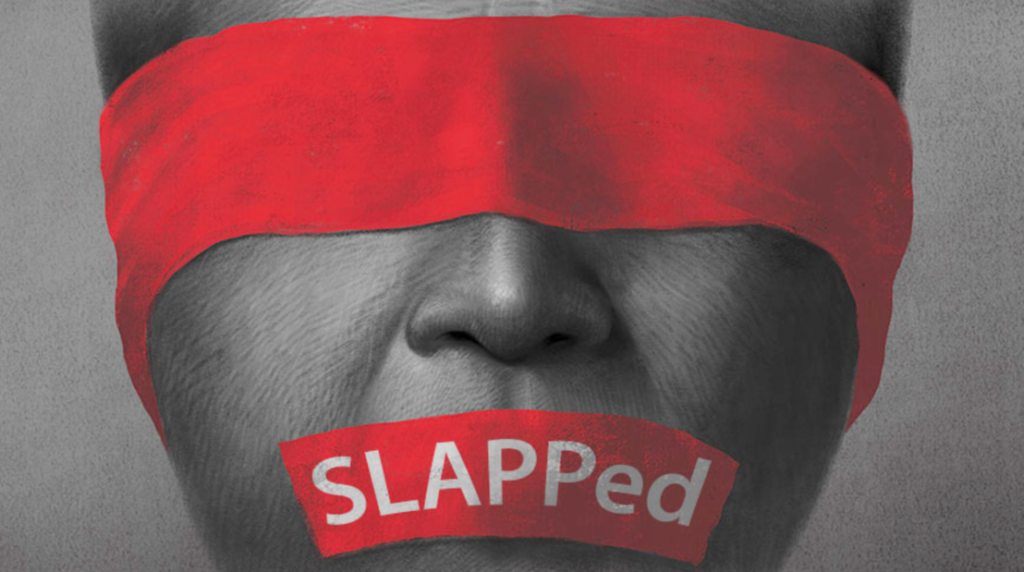
The EU is still trying to be a force for good in a troubled world, even if it doesn’t always succeed, and it aims to get better at it. The world seems to be getting ever-more difficult, while those trying to make things better come up against the enemies of democracy and its institutions. During the early May plenary session, for instance, MEPs from the Green group pointed out how Pegasus spyware had been found on the mobile phone of the Spanish Prime Minister. It can record conversations and steal passwords and – amazingly – you can buy it on-line, although it’s not as free as it sounds. For instance, Estonia wanted to buy it specifically to track Russian agents working for the Kremlin in Estonia, but after intervention by Russia itself, its Israeli manufacturer agreed to change it so that it couldn’t track Russian phones. Israel didn’t want to upset Putin, it seems; it would rather lose a potential Estonian customer. Acting on the orders of Hungarian prime minister Viktor Orbán, Hungary routinely uses Pegasus to spy on the government’s opponents (and in Hungary’s case there must be quite a large number, albeit not a majority in electoral terms, it seems).
MEDIÆVAL AGGRESSION
However, the EU wants to get tough on Putin and his war machine. First and foremost, it wants to cut its reliance on Russia for oil and gas. Not every EU country is happy about this; they have come to rely on Putin for their fossil fuel needs. It’s not as if Putin made the stuff: it was formed from organic materials between 300 and 500 million years ago in the appropriately-named carboniferous era. Just to the south of what is now Siberia, for instance, on the north-east coast of the Tethys Ocean (and ironically in what is now part of the United States), vegetation we wouldn’t recognise (along with leaves, tree trunks, insects, fish and other organic material) sank into still, stagnant black waters.
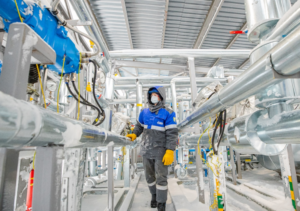
The air contained far more oxygen than we have ever known: 50% more than we have today. In temperatures already far higher than anywhere on Earth now, kerogen (the organic material in oil shale that will be distilled into oil one day), begins to yield its hydrocarbons. At between 2,000 and 3,800 metres deep, with temperatures around 1000 Celsius, it starts to turn into oil. When it sinks further, perhaps to between 4,000 and 5000 metres, it produces lighter hydrocarbons, gradually turning into methane (CH4). It has passed through what chemists, geologists and prospectors call the “gas window”. Production of hydrocarbons stops below 8 to 10 kilometres because it’s too hot there for them to exist. The oil and gas rise through porous sandstone but can get trapped by shale, from which our modern-day oil and gas companies extract it. Continental drift has granted the bounty to Russia, but other fields exist elsewhere, of course. Russia’s reserves are estimated in some quarters at 80-billion barrels, just below the United Arab Emirates’ 97-billion, and ahead of Libya’s 48-billion. None of those are in the same league as Venezuela: 303-billion – that’s around 18% of the world’s total – but beset by poverty and conflicts that badly impact on the ease of extraction. Or how about Saudi Arabia with 267-billion? Even Canada has more than Russia: 167-billion barrels. Not all of it, of course, is easy to get; it’s not only Venezuela that has problems. These difficulties with obtaining nature’s fossilized bounties are what have given Russia such a strong hand to play. Perhaps that’s why it exports more than anyone else. But nobody seems quite sure who really has the biggest supplies.
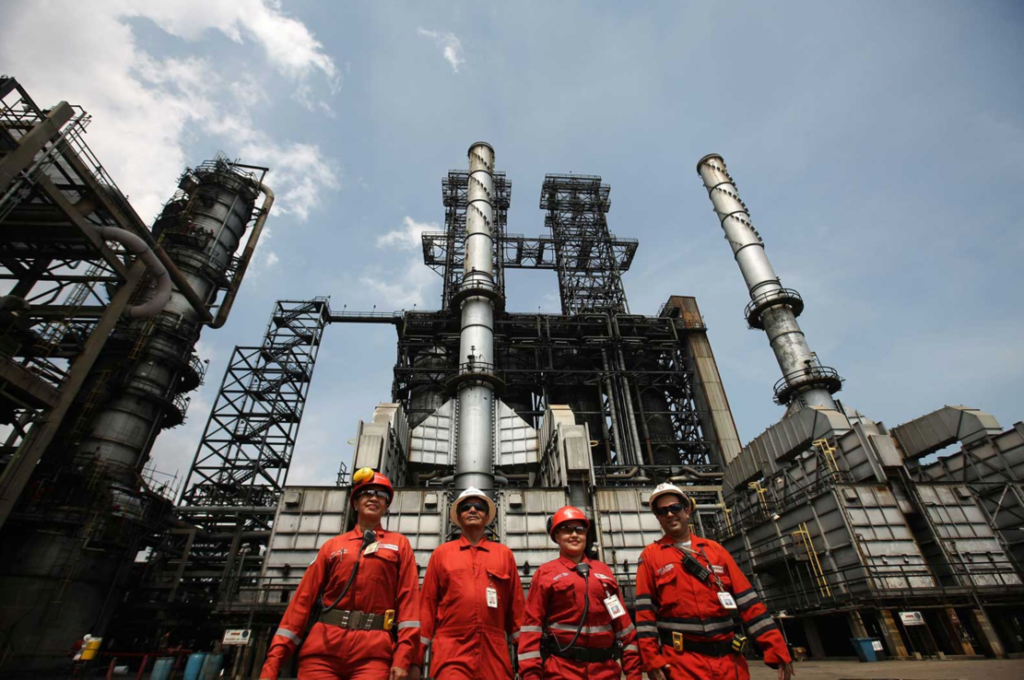
In 2020, Russia’s state-controlled Rosneft sold its Venezuelan oil assets to an unnamed Russian wholly owned company to preserve Mocow’s assets against US sanctions. During several years, Rosneft helped Venezuela circumvent sanctions by lifting Venezuelan crude to other markets.
However, despite conflicting claims, according to “Worldometer”, Russia has the most gas after all: very nearly 1.7 million million cubic metres ( MMcf), just ahead of Iran and Qatar. 24.3% of the world’ total supplies, in fact. The websites all disagree on who has what supplies: some say Venezuela is way in front, others say it’s nowhere, even placing Saudi Arabia (almost 300 million MMcf) behind the United States, with almost 370 million MMcf). Who do you believe? And does it matter? Wikipedia puts Iran first, Russia second and Venezuela down in 8th place. The fact is that Russia insists on being paid in roubles and the EU refuses. It doesn’t want to prop up a rogue government that is invading a neighbour, even if it calls its war a “special military operation”. It was European Parliament President Roberta Metsola who described Putin’s invasion of Ukraine as Mediæval aggression. She has a point, I think. The EU wants to cut off Russia’s gas access to the Union, however difficult this will be for those countries that rely on it. It’s a case of trying to phase it out, although it’s being suggested that the EU could also ban anyone from shipping it or insuring it. It’s claimed by Bloomberg, the 24-hour financial news and information provider, that the draft legislation will affect shipments to every country in the world.
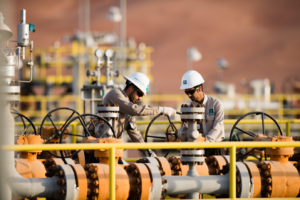
“Russia will never win,” said a confident-sounding President Emmanuel Macron. “We believe in freedom and have faith in the future,” he told delegates at the last session of the Conference on the Future of Europe. He also said that the perpetrators of war crimes will not be allowed to get away with it. “We will fight against impunity for those committing crimes,” he told the Conference. “It is our duty to be by Ukraine’s side and we will help it to rebuild”. He also warned against acts of vengeance when the conflict is finally over. “We must never give in to our desire for revenge.” The husband, brothers, fathers and sweethearts of women who have been raped may find that a tough one to obey. But meanwhile, the reforms and new measures the many delegates have been debating must go ahead anyway, in order to strengthen the independence and effectiveness of Europe. He went on to say that Europe must agree to invest more in defence (a lesson taught to Europe by Putin) and on clean energy. Russia must not be able to hold Europe over a barrel. “Europe must become an environmental power,” Macron said.
Up to now, exports to the EU have accounted for more than half of Russia’s total exports. The EU is taking control of Putin’s piggybank. Even those Russians who believe his every word (some do, it seems, extraordinary as that may appear) will start to feel the pinch. In any case, whoever has the world’s largest supplies, Russia still has massive leverage when it comes to selling the stuff. “Europe is still too reliant on autocrats where energy is concerned,” European Parliament President Roberta Metsola warned the conference delegates,” reminding them also that a switch to renewable energy is “as much about security as it is about the environment”.

We may not like Putin or his strongarm tactics over oil but the current situation reminds me of a joke I heard in primary school. Question: “what do you call a large gorilla holding a machine gun?” Answer: “Sir”. Putin, it seems, is that gorilla. In the short term, the effect of electric vehicles on the U.S. fossil fuel markets would appear to be negligible, according to Joshua Linn, a senior fellow at the energy think tank Resources for the Future. Electric vehicle additions may — because of the way federal fuel standards are calculated using fleet averages — even increase oil and gasoline demand, he warned. To quote another old song, “I beg your pardon; I never promised you a rose garden”. Just as well, really. The switch to electric vehicles won’t help us much as many hope on the oil dependency front, either. The switch may reduce demand for fuel oil, but it could actually raise demand for natural gas. According to S&P Global Market Intelligence, “U.S. oil and liquids demand could drop by about 25% from 2019’s 20.3 million barrels per day (that was before the COVID pandemic) to an estimated 15.3 million b/d by 2050,” according to an ‘Inflections’ base case from IHS Markit research (yes, it really IS spelled Markit).
ALL FOR ONE AND ONE FOR ALL
That would seem to be a sensible approach to the EU’s difficulties. It was, of course , the motto of Alexandre Dumas’s “The Three Musketeers”, although it first appeared in William Shakespeare’s Rape of Lucrece in 1593 (verse 21):
“The aim of all is but to nurse the life
With honour, wealth, and ease, in waning age;
And in this aim there is such thwarting strife,
That one for all, or all for one we gage;
As life for honour in fell battle’s rage;
Honour for wealth; and oft that wealth doth cost
The death of all, and all together lost.
It is not a very cheery work, as you may gather, about how the wife of an honourable soldier is raped by his friend and so commits suicide to overcome her “dishonour”. In the Latin translation of the phrase, “Unus pro omnibus, omnes pro uno”, it is the motto of Switzerland. Whatever its origins, though, it supports the notion of mutual aid and togetherness, which is what Europe needs right now.
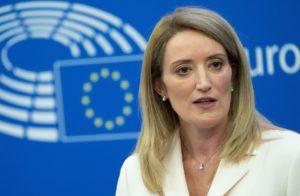
The conference newly ended is supposed to be the start of something quite new: an attempt to match up the aspirations of the populace with the actions of the EU, never an easy thing to accomplish, as Metsola pointed out, because different groups of different ages and backgrounds aspire to different things. In her speech, President Metsola spoke about the reality of a gap which exists between what people expect and what Europe is able to deliver at the moment, particularly in the areas of health, energy and security. She also said that the future of Europe is tied to the future of Ukraine. “And I ask: how will history judge our actions?” she asked. “Will future generations read about the triumph of multilateralism over isolationism? The cementing of an inter-dependent relationship between nations and people who are proud of their differences as Laura (a Conference delegate who had spoken earlier), but who understand that in this new world, the future can only be together?”
Macron reminded delegates that some countries had addressed the Covid pandemic with an authoritarian clamp-down. In the United States, right-wing groups condemned any attempt to stop the spread of the virus as “authoritarianism”, telling followers to ignore mandates to wear face masks and also to refuse vaccination. One of the silliest banners I saw in a report on demonstrations in the United States was “Jesus is my vaccine”. I understand that widespread plagues of various kinds were common once humankind switched from the hunter-gatherer lifestyle to settle in communities. Close proximity helped bacteria and viruses to spread more easily. In those religious times of the so-called “middle-ages”, with a great many religious communities around, there would have been no shortage of prayer. The Cyprian plague of 250 AD was even named after its first victim, the Christian bishop of Carthage.
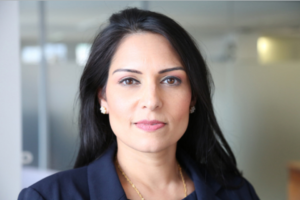
We must not forget the plight of Moldova, described by United Nations Secretary-General as Ukraine’s “most fragile neighbour”. Despite not being a wealthy country, it has taken in almost half a million refugees from Ukraine, earning the praise and admiration of many. Traumatised refugees are finding it far harder to reach and settle (even temporarily) in the relatively wealthy United Kingdom, whose system for granting temporary visas has been described as “Kafkaesque”, after the labyrinthine bureaucracies described in the nightmare worlds of Franz Kafka’s books. I bought a copy of one of them, The Trial, in English from the tiny bookshop inside his miniscule house near Prague Castle when I was there. Other countries have set up easily navigable routes to getting a visa, while the UK seems to have set about devising the most unfriendly system they could. The UK’s Home Secretary, Priti Patel insists on imposing what she calls “vital security checks” on women fleeing with their small children. 140 other countries don’t do that, proving that the UK is out on its own in terms of not offering much-needed help to fleeing Ukrainian refugees.
Moldova has won praise from António Guterres, who told an audience in Moldova’s capital, Chișinău, that it is the “most fragile” of Ukraine’s neighbours and that it deserves massive financial support to reflect its generosity. He also warned that he was afraid that Russia might spread its war there. “Your sovereignty, independence and territorial integrity, and the solid progress you have made over the past three decades, must not be threatened or undermined,” he told them. Moldova has taken in the highest number of refugees compared with the size of its own population, putting the UK to shame. The UN has appealed for $2.5-billion (€2.37-billion) for humanitarian aid in Ukraine and an additional $1.85-billion (€1.75-billion) to support Ukrainian refugees in other countries. If you have never visited Moldova, I can personally recommend it as a place to visit.
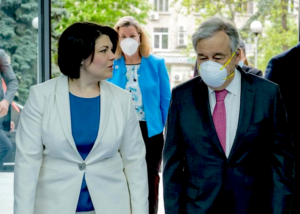
Meanwhile, the European Union will continue to assess the 49 proposals for change contained in the 320 measures agreed by those who have been working on the project. The topics mentioned cover a very wide range of issues, such as climate change, the environment, health, making the economy stronger, social justice and jobs, the EU’s place in the world, values and rights, the rule of law, security, digital transformation (presumably that just means becoming more up-to-date), democracy, migration, education, culture, youth, and sport. It has taken a year to get this far, with participants having to spend several weekends away from home. “Citizens, especially young people, are at the heart of our vision for Europe,” Metsola told the closing session, “They have directly shaped the outcome of the conference. We are at a defining moment of European integration and no suggestion for change should be off-limits. We should not be afraid to unleash the power of Europe to change people’s lives for the better.” MEPs have already acknowledged that some of the reforms being called for will require changes to the founding treaties. Macron told the meeting that he would support such a move: he wants to see decision making made easier. Former Belgian Prime Minister Guy Verhofstadt, who has also criticised Boris Johnson for his half-hearted response to the Ukrainian refugee crisis whilst also failing to sanction the many Russian oligarchs resident in the UK, said: “Citizens’ recommendations and the Conference conclusions, offer us a roadmap to avoid the European Union becoming irrelevant or even disappearing,” adding that in his view, “A new, effective and more democratic Europe is possible.”
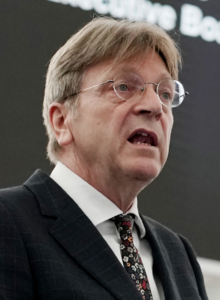
It all sounds very grand, but the EU’s record on following through on its better ideas is not wholly without fault. Inertia gets in the way, but that may be changing: it’s the bad things that may lead to a faster, more decisive response: there’s nothing like an emergency to spur people into action.
Ask any fireman. The bad things certainly should not make us waver in our determination, according to Macron. “I’m convinced,” he told the meeting, “that crises should not turn us from our proposals.” He said that “independence and effectiveness” are what matters. Does Europe have those qualities? We shall have to wait and see, but with the SARS-CoV-2 virus battering at one door and the murderous Putin battering at another, time is not on Europe’s side.
But even so, the response to events in Moscow and Strasbourg suggest that democracy can make a bigger noise than bombs, and hopefully one that will resonate for longer.

